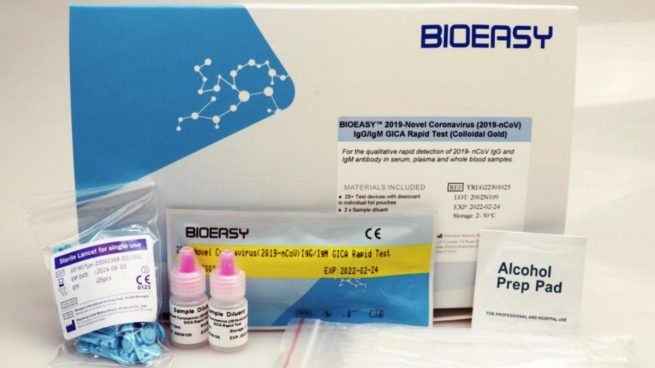Microbiology laboratories report that the tests bough by the Government have a sensitivity of 30% when they should exceed 80%
The much-announced rapid tests for coronaviruses with which the Government wanted to start testing large parts of the population, in order to find out the real size of the contagion, are said by many hospitals to be unsatisfactory.
This has been confirmed by several microbiology laboratories in large hospitals during the analyses that have been carried out with the kits recently arrived from China. The results of these preliminary tests are discouraging: “They do not identify positive cases as expected,” says a source who took part in the tests and who asks for anonymity.
The rapid tests, manufactured by the Chinese company Bioeasy, based in Shenzhen, one of the technological leaders of the Asian country, have a sensitivity of 30%, when it should be higher than 80%, the source indicates.
One of the microbiologists who has analysed the Chinese test says: “With that value it does not make sense to use these tests,” as a result of which the conclusion of the experts who have evaluated these kits is that they will have to continue using the current test, the PCR. This has now been reported to the Carlos III Health Institute, managed by the Ministry of Health.
The coronavirus detection tests currently used by Spanish hospital microbiology laboratories are based on a molecular technique called PCR (polymerase chain reaction) that detects the virus’s RNA in a sample (a stick is inserted into the nose or the mouth to collect it). It is a laborious technique, which requires specific equipment and takes up to four hours to provide a result.
Rapid tests, on the other hand, work in a similar way to pregnancy tests: the sample is diluted and deposited in a cartridge with a test strip that identifies if it is positive, negative or invalid. The tests detect the presence of antigen and the result is obtained in 10 or 15 minutes.
The Government, which has bought 340,000 tests, intends to subject health workers and the elderly in care homes to a massive screening before extending it to more population. This Wednesday the Minister of Health announced that he has ordered 5.5 million of this type of test, but it is unknown if they are from the same manufacturer.
To questions put by the Spanish press, the Ministry of Health confirmed late Wednesday the poor results of the rapid test kits. A spokesman from the Carlos III Health Institute said, “they have detected a sensitivity that does not correspond to what is established in the technical data.”
Following the preliminary tests carried out by these microbiology laboratories, the Spanish Society of Infectious Diseases and Clinical Microbiology (SEIMC) has prepared a positioning document, to which EL PAÍS newspaper had access, and which it has already sent to the health authorities, including the Institute of Health Carlos III. Their recommendation is not to use these tests and to continue carrying out PCR.





